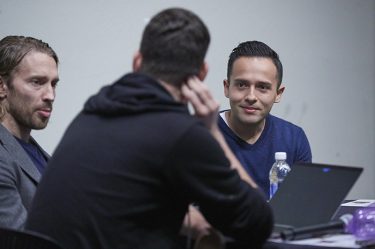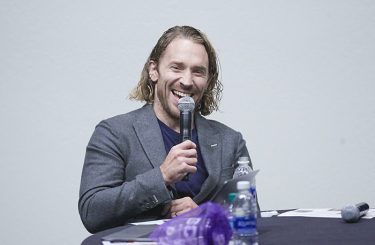Story by Lana Sweeten-Shults
Photos by David Kadlubowski
GCU News Bureau

Software engineer Maurcio Molina’s path to Google wasn’t a straight one. It zigged and zagged and swerved and jutted. But it got him there.
“I failed my first computer science exam, believe it or not,” said Molina, one of four “Googlers” (Google employees) who on Wednesday gave Grand Canyon University students a peek behind the curtain of the $75 billion technology leviathan, one that consistently lands on the top of Fortune’s Best Companies to Work For list.
But he stuck with it and applied at Google.
Then got rejected.
So he applied at Microsoft. That’s when the interviewer told him and everyone else in the room, “All right. Everyone here is applying for Azure.”
“What’s that?” Molina asked.
“It’s the cloud,” the interviewer answered.
“What’s the cloud?” Molina queried. “I didn’t know anything, but I managed to get the job,” he said.
A year and a half later, he applied at Google again.
And he got rejected. Again.
“But I learned a lot from those two rejections and came in for a third time. … You just have to keep going. Don’t expect it to be easy. If you’re not failing, you’re probably not learning.”

The panel talk in the Theology Building's Howerton Hall, called “A Day in the Life of a Google Employee,” also featured fellow Googlers David Tully and Alexis Russo, account executives at the company, and John Dzera, account manager, who served as the panel moderator.
Their appearance was made possible by Grand Canyon Education's Digital Marketing team with assistance from Strategic Employer Initiatives and Internships. The Digital Marketing team works with Google to create ads for YouTube. Those ads go from higher-level brand attribute ads to student testimonials, said Chad Wilson, GCE's Executive Creative Director.
“It’s been a great partnership. We do a lot of work with them,” said Wilson, who introduced the talk alongside Shawna Barnett, GCE’s Executive Director of Digital Marketing.
Molina said his path to Google began with him simply applying.
A professor told him his chances of getting hired at Google were slim, “but the chances are zero if you don’t apply."
"And it may not be a direct route,” Molina told students. Like him, they might need to get experience in other areas, fail a few times, apply a few times but, “I say, go for it. … You should be aware that any employer would be lucky to have you.”
Molina said he “learned how to do a Google interview by interviewing at Google.” He took interviewers’ feedback, drank in the comments, such as “You were too slow” or “It was really confusing,” learned from those comments, practiced for his next interview and tried again.
“Interviewing itself is a skill. You might have all the skills that you need to do the job … but if you don’t have the skills to at least demonstrate it – that’s the hard part.”

Tully also took “a long and winding road” to get to Google. He started in finance and was a certified public accountant at Deloitte before going into sales and marketing. He also loved technology and thought, “I want to change it up.” That’s when he set his sights on Google.
His advice for students: Network.
Tully knew someone in Ireland, his home country, who had worked for Google. When he told that person he was planning to build a website to showcase his resume and his digital savvy, his friend told him: “‘Please don’t build a website. Everyone does that.’ … That kind of insider knowledge is critical.”
Tully went through eight interviews and talked to a slew of different teams, including teams that weren’t even in marketing.
They asked him the typical interview questions, such as, “Can you demonstrate your leadership abilities?” along with not-so-typical questions.

Russo added, “They’re trying to understand how you think through problems, not necessarily the answer you arrive at. I think there’s a little comfort in knowing that’s what they’re looking for. I remember I had to do a mock presentation in front of a room of 12 Googlers. … It’s intimidating. At the end of the day, this might sound corny, as long as you’re true to yourself and honest, that authenticity shines.”
Besides sharing how they got to Google and a little about the interview process, the panelists shared what they love about the company.
In addition to the inclusive culture, Russo loves how “it’s highly encouraged for you to network within Google, meet new people, find out what their different roles are. … It’s really encouraged for you to learn more, challenge yourself, find out what you’re passionate about. I think that’s the coolest thing.”
Tully appreciates the company’s willingness to allow its employees to try new things, which keeps the atmosphere there fresh and exciting.
“If you have an idea, it’s like, yeah, let’s try it and see what happens. So you kind of have this real sense of freedom where if you’ve got something, you can just go and do it, and if it works, they’ll scale it out really fast, which is pretty amazing,” said Tully, who has worked at other companies that have a particular way of doing things and if you ever try to make a change, “Good luck, it’ll take years.”
The panelists spoke about Google’ famous perks: the free food, free coffee, gyms onsite and free employee massages.
“I like how they cater to health,” Molina added. “… The health wellness center is right on campus, having the gym onsite, being able to shower there every morning.”

Dzera also spent a little time testing students on Google trivia:
- What was the first Google product?
- What was the first Google Doodle?
- What was Google’s first microkitchen snack?
The answers:
- Google Search was the first Google product, though the company now touts eight products with a billion users, including Gmail, Maps and Android.
- The Burning Man doodle was the first Google Doodle, because founders Larry Page and Sergey Brin were out of the office to go to the Burning Man event.
- And Swedish Fish was the company’s first micro kitchen snack.
When one student asked the panelists about life-work balance, Russo said it’s something she still struggles with; it’s difficult for her to turn off and disconnect.
“It is intense,” Tully said of working for Google. It’s a fast-paced environment in an industry that’s always changing, but he said he tries to find that balance, particularly with a 2-year-old at home. He leaves at 5 p.m. when he needs to for family events and has learned to manage his time and work.
Then there’s the study done on Googlers in which researchers looked at 1,000 employees over three months. Tully remembers from that study how “a quick look” at your email often turns into a night of work. So it’s important to be aware that “little things like that could actually make a difference to your work-life balance,” he said.

Other questions:
What about Google hardware, such as Pixel phones?
Dzera said it’s been only four years since Google developed its first hardware.
“You’ve seen a few generations of Pixels now, and the Hub has come up. You have the Nest Doorbell. … It’s a big focus area for Google as a company.”
What’s the next trend in digital marketing?
Tully remembers when virtual reality was supposed to be the next big trend, but so far it hasn’t turned out that way. “From the Google point of view, we’re doing a lot of work on voice and home assistance and just assistance in general,” he said. “… But I think no one’s got a crystal ball.”
Follow GCU senior writer Lana Sweeten-Shults at [email protected] or at 602-639-7901.





















































